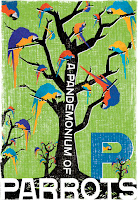If you have a group of parrots, you can say “a pandemonium of parrots” instead of “a group of parrots.” Isn’t that crazy? Pandemonium usually means chaos or disorder, but if you attach “of parrots” after it, it just means parrots in a group considered to be one unit. Say it with me: “a pandemonium of parrots.”
My next favorite collective noun is “a quiver of cobras.” These are king cobras in this picture here, and as many as 30 to 40 baby cobras are born in a nest made of vegetation gathered by their mother. Obviously, you should never, ever, ever step into a quiver of cobras. Big mistake.
My final favorite example is “a troubling of goldfish.” It should be a “troubling of tarantulas” or something, but it’s not.
Actually goldfish are quite social and like living with other fish. I learned from this book that goldfish have been known to interact with any fish belonging to their species: that’s quite social, actually. They like having friends.
A Zeal of Zebras will also tell you about an unkindness of ravens, a galaxy of starfish, and an embarrassment of pandas.
A Zeal of Zebras: An Alphabet of Collective Nouns by Woop Studios. Unpaged. 2011: Chronicle Books. Virginia Readers’ Choice (primary grades), 2013-2014. This book would also work well for intermediate grades.









